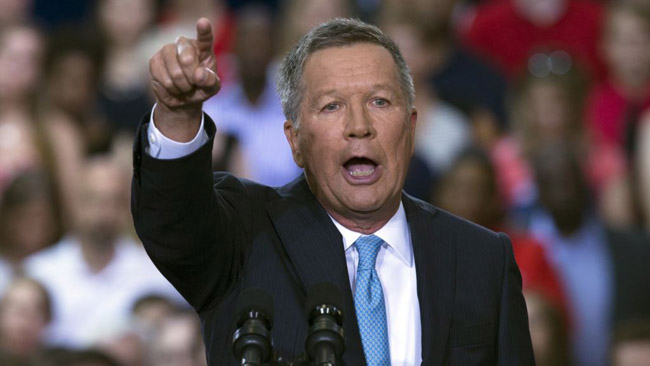The landmark “Super Tuesday”
Expert: “Governor John Kasich’s victory in his home state allows him to theoretically catch up with Donald Trump”
On the second “Super Tuesday,” when US primaries came to five large states, the campaign’s frontrunners Democrat Hillary Clinton and Republican Donald Trump strengthened their positions. “Florida, North Carolina, Ohio, Illinois, Missouri: We did it. And together, we are going to win this nomination,” 68-year-old Clinton tweeted.
Meanwhile, her possible opponent in the presidential election, 69-year-old billionaire Donald Trump, won in four states, but the defeat in Ohio at the hands of local governor John Kasich means Trump cannot declare himself the Republicans’ presidential candidate just yet.
Another Republican nominee Senator Marco Rubio, who had hoped to win in Florida, lost at his home ground and announced his withdrawal from the presidential race. It should be noted that Trump’s secure victories in large states concern the Republican Party’s leadership, since many members of its establishment disagree with the party frontrunner’s policy proposals and manner of speaking.
In an optimistic speech in Florida, Clinton criticized Trump, saying that Americans are hungry for politicians who are able to make decisions. In particular, she stated her readiness to tackle issues of student debt, expensive child care, and general inequality.
“THE AMERICANS’ CHOICES INDICATE THAT THEY BET ON EXPERIENCED, HARDENED FIGURES”
Professor Oleksandr TSVIETKOV, Americanist, Diplomatic Academy of the Ministry of Foreign Affairs of Ukraine:
“The second ‘Super Tuesday’ turned out to be a landmark event, for before it, the intrigue was whether Republican and Democratic runners-up would be able to catch up with the leaders. Now, it is clear that the leaders strengthened their positions. In particular, Hillary Clinton won two-thirds of the number of delegates needed for nomination at the party convention to be held in summer, and Donald Trump has a little less than half of it.
“For now, five nominees (Republicans Donald Trump, Ted Cruz and John Kasich, and Democrats Hillary Clinton and Bernie Sanders) will stay in the race. But it is Trump and Clinton who have the best chances to get a majority of convention delegates. Had Trump won in Ohio, then he certainly would have got a majority of delegates. However, Governor Kasich’s victory in his home state allows him to theoretically catch up with Donald Trump, but he needs to win all 10 future primaries, and get all the delegates. It is practically impossible, but still, the race stays competitive. Sanders will also continue his fight with Clinton until the very end. Therefore, the winners of these races will be most likely determined in June.
“But the Republican race is where there is more intrigue, due to splits within the party. If Trump gets most delegates, it may happen, for the first time in the last hundred years, that the convention will put forward a different candidate, not the absolute winner. Some politicians threaten to nominate the third candidate, an independent Republican. Trump’s supporters believe he can bring fresh social forces and voices into the party, these are mostly white-collar workers. Clinton’s speeches address not only social issues, but economic as well, concentrating on jobs. This is a very strong position for all nominees.
“The Americans’ choices indicate that they bet on experienced, hardened figures rather than relatively young and untested politicians, preferring people who have shown ability to withstand downturns of life and political career.
“The weak point of Trump is that he has no experience in politics and public service, but has been a successful businessman. Therefore, people in the five states voted for those they know, not for new people on the block.
“Still, Clinton is in the lead, for she uses socio-economic slogans more skillfully and has even borrowed Sanders’s winning points.
“As for Cruz’s and Kasich’s chances, they have both lost when going one-on-one against Trump. Cruz has many opponents within the party and among US senators. The Republican party would like to support Kasich, but his was the weakest position so far.
“Kasich has gentle character, Trump even called him a baby during a debate. On the one hand, this is an advantage because Kasich never went personal during his discussions with Trump. To win, the governor of Ohio must get all the delegate votes in the remaining primaries, and it is theoretically possible but very difficult.
“Parts of the Republican party will not support Trump and will do everything to support another candidate. Who can that be – Cruz or Kasich – is hard to say.
“Senator Rubio’s loss in Florida happened because he had no support from the Bush family. At the beginning of the campaign, Jeb Bush and Rubio competed with each other and this inertia has probably lingered there. Most importantly, Rubio turned out to be not mature enough for these races. He has a good aura and political talent. So he said he was considering participation in these races as a chance to do well in the next presidential election.”
Section
Day After Day





